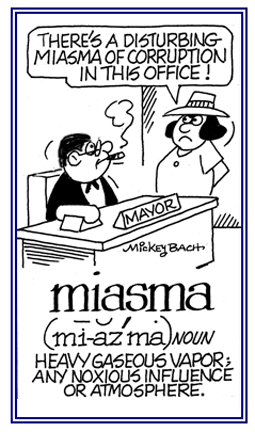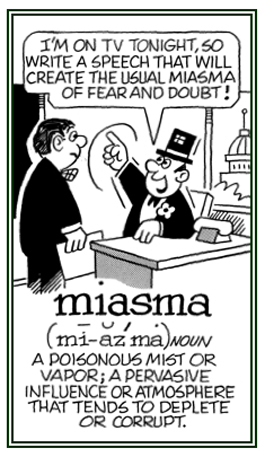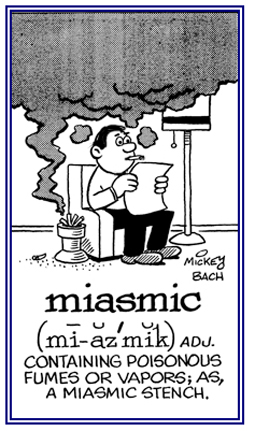miasm-, miasma-, miasmat-
(Greek: pollution, stain, contamination; to pollute, to defile, to corrupt)
2. Human effluvia consisting of vapor or fumes: Some idiomiasmas are produced by odors of human decompositions (dead bodies) or excrements from sewers.
2. Unhealthy vapors rising from the ground or other sources: Certain lakes are usually full of vegetable matter undergoing decomposition and they often produce large quantities of miasms.
This miasm unit is usually a spelling variation of "miasma".
2. A thick, poisonous vapor or mist which is believed to be made up of particles from decomposing material that can cause illnesses and are identified by their foul odors: The people around the factory are concerned about the miasma that is coming from its chimneys through which smoke and gases are escaping.
3. Unhealthy vapors rising from the ground or from other sources: Shirley couldn't determine which was worse, the miasmas of the marshes or the miasmas of cigarette smoke in restaurants; because she considered both of them as pollutions of the air.
4. Any noxious environmental influences: There are miasmas of evil showing up in many parts of the world as indicated by terrorist attacks and other murders that are taking place.
5. Etymology: from Greek miasma, miasmatos, "stain, pollution" which is related to miainein, "to pollute".


Go to this Word A Day Revisited Index
so you can see more of Mickey Bach's cartoons.
The miasmatic theory of disease apparently started in the Middle Ages and continued on into the mid 1800's, when it was used to explain the spread of cholera in London and in Paris, partly explaining Haussmann's latter renovation of the French capital.
Baron Georges-Eugène Haussmann (March 27, 1809–January 11, 1891) was a French civic planner whose name is associated with the rebuilding of Paris. He was born in that city of a Protestant family from Alsace. The Haussmann Renovations, or Haussmannization of Paris was a work led under the initiative of Napoléon III and the Seine préfet, Haussmann, from 1852 to 1870.
The project encompassed all aspects of urban planning, both in the center of Paris and in the outside districts: streets and boulevards, regulations imposed on façades of buildings, public parks, sewers and water works, city facilities and public monuments.
The disease was said to be preventable by cleansing and scouring of the body and items. Dr. William Farr, the assistant commissioner for the 1851 London census, was an important supporter of the miasma theory. He believed that cholera was transmitted by air, and that there was a deadly concentration of "miasmata" near the Thames River banks.
Another proponent of the "miasmatic" theory was the renowned Crimean War nurse, Florence Nightingale (1820-1910), who was known for her work in making hospitals sanitary and fresh-smelling.
2. The description of poisonous effluvia or germs polluting the atmosphere; miasma.
3. Referring to dangerous, foreboding, or deathlike influences or atmospheres.
2. Characterized by an oppressive and unpleasant atmosphere: Historians know about some territories from the past and their long and miasmatic histories.
3. Etymology: from French miasme; from Greek miasma, "defilement, pollution"; which came from miamein, "to pollute".
2. Diseases caused by unhealthy fumes: It is believed that the Romans were the first to invent a sewage system, thereby diverting miasmatical effluvia into and through the drains and out of the cities.
2. A descriptive term for something that is unpleasant, a depressive mood, or an atmosphere resulting from some kind of negative situation.
The claim that foul-smelling emanations spread disease was quintessential miasmatism.
2. Those who are versed in the phenomena and nature of noxious exhalations.

Go to this Word A Day Revisited Index
so you can see more of Mickey Bach's cartoons.
2. The study of or research about fogs and smogs; especially, those affecting air pollution levels.
![]() Article about Miasmas to Microbes.
Article about Miasmas to Microbes.
